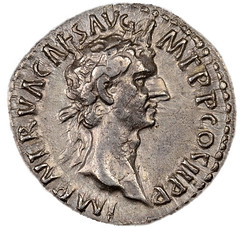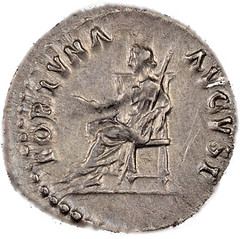
PREV ARTICLE
NEXT ARTICLE
FULL ISSUE
PREV FULL ISSUE
NEW ROMAN DENARIUS COIN TYPE DISCOVERED
In an article published in Coin Week David Vagi describes a new Roman coin type discovery. -Editor


About two years ago NGC Ancients shared the discovery of a new type of silver denarius of Hadrian, who ruled the Roman Empire from 117 to 138 A.D. That coin had been submitted for grading and we were pleased to have reported its discovery. We now may share another discovery denarius – this one being a new variant for the Roman Emperor Nerva, who ruled briefly from 96 to 98 A.D. This particular coin, struck in 96, would easily slide beneath the radar because its obverse inscription and portrait type are well-attested, as are its reverse design and reverse inscription. However, this particular coin features an unknown combination of reverse type and inscription. The reverse shows the seated figure of Fortuna, the Roman personification of good fortune and prosperity. Known to the Greeks as Tyche, she was among the most familiar and beloved of all Roman divinities, and one very commonly encountered on the coinage of Nerva. The two usual variants of Nerva’s denarii depicting Fortuna are: FORTVNA AVGVST, Fortuna standing, holding a ship’s rudder and a cornucopia. FORTVNA P.R., Fortuna seated, holding two grain ears and a scepter. On this coin we encounter the inscription of the former, and the design of the latter, which until now does not appear to have been noted and which can only have been an engraving miscalculation. Many scholars have suggested that in the production of Roman Imperial coin dies the inscriptions were cut by engravers best described as technicians, whereas the central designs were engraved by artists. If this was the case, it would seem that a die with the inscription for one type was assigned improperly and was engraved with the inappropriate design. In establishing the fact that this type appears to be unpublished we conferred with specialists, including Curtis Clay and Dr. Bernhard Woytek, the head of the ‘Documenta Antiqua’ division of the Institute for the Study of Ancient Culture at the Austrian Academy of Sciences. The office he heads is a research unit devoted to numismatics, epigraphy, papyrology and ancient law. He also lectures in numismatics and monetary history at the University of Vienna, Austria. Dr. Woytek already has authored the now-standard work on the coinage of the Emperor Trajan (A.D. 98-117) and is currently revising the part of The Roman Imperial Coinage (the most important academic catalog for coins of the Roman Empire) that covers the reigns of Nerva and Trajan. Dr. Woytek confirms that this reverse combination is new and undocumented, though he notes that when he includes it in the revised volume of RIC it would be categorized as variant of known types rather than as a wholly new type. Both this denarius of Nerva and the earlier ‘discovery’ denarius of Hadrian illustrate how previously undocumented ancient coins are bound to turn up with some frequency, even though since the 15th-century scholars have dedicated themselves to compiling the most complete catalogs possible. To read the complete article, see:
Wayne Homren, Editor The Numismatic Bibliomania Society is a non-profit organization promoting numismatic literature. See our web site at coinbooks.org. To submit items for publication in The E-Sylum, write to the Editor at this address: whomren@gmail.com To subscribe go to: https://my.binhost.com/lists/listinfo/esylum All Rights Reserved. NBS Home Page Contact the NBS webmaster 
|